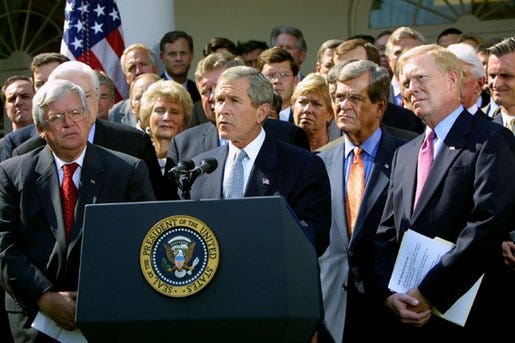Repeal Of 2002 Force Authorization Would End 'Forever Wars' -- But Even There, McConnell Objects
House moved to repeal 19-year-old authorization of force on a bipartisan vote
In the fall of 2002 — with US forces already committed to defeating the Taliban following the September 11, 2001, terrorist attacks — Congress approved a fresh piece of legislation.
Called an “authorization of military force,” or AUMF, the measure was designed to allow the president of the United States at the time, George W Bush, the authority to militarily invade the nation of Iraq.

Bush — and members of his administration — were arguing that Iraq's then-leader, Saddam Hussein, possessed so-called “weapons of mass destruction,” or WMDs including uranium for nuclear devices.
Bush, of course, would go ahead with the invasion — in what would become one of greatest military and foreign policy debacles in US history.
The operation, codenamed Operation Iraqi Freedom, of course, would turn up absolutely no evidence that Saddam had — or ever had — any WMDs. The aftermath of the invasion itself would become incredibly botched — and become known for some of the most horrific war crimes and atrocities committed by US troops at the notorious Abu Ghraib prison.
The years pass
However, over the years — and successive presidential administrations — that 2002 AUMF was used beyond its original mandate to justify other military operations and excursions.
In the process, it's become synonymous with the idea of American “forever wars,” where even US forces have been in Afghanistan nearly 20 years following the terrorist attacks that prompted US entry into that country in the first place.
Until now.
The House Friday — on a bipartisan vote — approved the repeal of the 2002 AUMF. Some 219 House Democrats and 49 House Republicans voted to repeal, while 160 Republicans and only one Democrat voted to oppose the repeal.
“As a junior Member of Congress, I took one of the toughest votes of my career when I voted against war with Iraq,” said House Foreign Affairs Committee Chairman Gregory Meeks (D-NY). “After nearly two decades, I am proud to have shepherded [Rep] Barbara Lee’s H.R. 256, repealing the 2002 AUMF, through Committee and now the House of Representatives.
“The 2002 AUMF is no longer needed for any ongoing military operations, and has not served as the legal authority for any military actions since 2011. With the House’s overwhelming bipartisan vote today, Congress took an important step in reclaiming its war powers and ending forever conflicts,” Meeks added. “My hope is that the Senate will quickly join the House in passing this long overdue repeal and send it to President Biden’s desk so we can finally bring this chapter of American history to a close.”
Sen Tim Kaine (D-Va) — member of both the Senate Armed Services and Foreign Relations committees — is eager to take up and pass the AUMF repeal in the Senate.
“The 18-year-old Iraq War authorization is obsolete. The Government of Iraq is now a partner, not an enemy, so the House’s vote to repeal it is both welcome and overdue,” Kaine said. “Now is the time for the Senate to follow suit and finally put the 2002 AUMF to rest before some future president wreaks havoc with it.”
In March, Senator Kaine reintroduced a bipartisan bill to repeal both the 2002 AUMF and the 1991 AUMF, which sanctioned the Gulf War.
Mitch McConnell's opposition
However, like so much that came before — even legislation approved in the House with a bipartisan majority — Senate Minority Leader Mitch McConnell (R-Ky) is ready to stand in the way.
“House Democrats claim this vote is an urgent act of Congressional oversight, and the Democratic Leader has indicated that the Senate will take it up with similar zeal,” McConnell said of Senate Majority Leader Chuck Schumer (D-NY).
“The right way to address ongoing terrorist threats is a debate worth having,” McConnell added. “I would have welcomed that debate before the Biden Administration began its hasty retreat from Afghanistan without a plan to sustain counterterror missions or support our friends.
“And it’s one we should have before we vote to repeal these authorities. Reality is more complicated, more dangerous, and less politically convenient than its supporters believe,” he said. “The fact of the matter is the legal and practical application of the 2002 AUMF extends far beyond the defeat of Saddam Hussein’s regime. And tossing it aside without answering real questions about our ongoing efforts in the region is reckless.”



